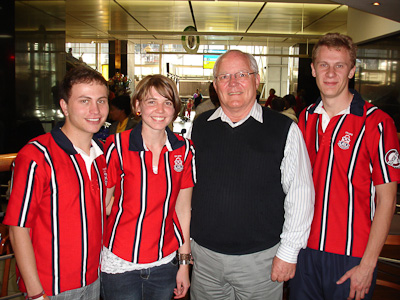Latest News Archive
Please select Category, Year, and then Month to display items
11 January 2021
|
Story André Damons
|
Photo Supplied
 Dr Ralph Clark
Dr Ralph Clark
The Afromontane Research Unit (ARU), the flagship research group of the University of the Free State (UFS) Qwaqwa Campus, has recently been granted R8,4 million to establish a Risk and Vulnerability Science Centre programme.
The Risk and Vulnerability Science Centre (RVSC) programme was established by the Department of Science and Innovation (DSI) as part of the Global Change Research Plan for South Africa and is funded by the DSI through the National Research Foundation (NRF). The RVSC will focus on the need to generate and disseminate knowledge about risk and vulnerability on global change challenges faced by local policy makers/ governance structures and communities in South Africa.
Invited to participate
Dr Ralph Clark, Director of the ARU, says the UFS, together with the University of Zululand and the Sol Plaatje University, has been invited to participate in Phase 2 of the RVSC programme. Dr Clark was approached by the DSI (on referral from the South African Environmental Observation Network – SAEON) in February 2020 regarding the potential for establishing a RVSC at the UFS Qwaqwa campus.
Subsequent interactions were held between the UFS and DSI, and in March 2020, the UFS formally accepted the DSI invitation. It has since been agreed that the RVSC: UFS will be hosted as a RVSC under the ARU umbrella, with dedicated personnel embedded at the UFS in this regard (internal processes and reporting) but reporting directly to the NRF regarding the RVSC.
Interest and support welcomed
Dr Clark welcomed this interest and support from the DSI-NRF, saying that the funds will further assist the UFS in growing its excellent and growing research portfolio and building more research capacity on this traditionally undergraduate-focused campus. “The RVSC will contribute to much-needed solutions in an area marked by major sustainability challenges and will assist in moving Phuthaditjhaba away from its negative apartheid history towards becoming a sustainable African mountain city,” says Dr Clark.
Kovsies still enjoy successful exchange opportunity
2010-08-25
 |
| Students Ian Botha, Lize Swart and SW Meintjies with Prof. Izak Groenewald (second from right) at the O.R. Tambo International Airport in Johannesburg upon the student’s recent departure to Virginia Tech. Photo: Supplied |
More than a decade ago, the then Chairperson of Free State Agriculture, Piet Gous, in collaboration with the then Dean of the Faculty of Natural and Agricultural Sciences at the University of the Free State (UFS), Prof. Piet Wilke, started an exchange initiative which still makes a difference to students’ lives today.
Students at the university get the opportunity to go and study at the Virginia Polytechnic Institute and State University (Virginia Tech) in Blacksburg in the United States of America (USA) during the second semester. During the first semester the UFS then receive American students. Since its inception in 1998, 142 students have already participated in the exchange programme.
“It is not only about six months’ studies at an American university. It is about the expansion of horizons, the creation of new frames of reference and exposure to other cultures and customs in order to attain and experience more life capacity,” says Prof. Izak Groenewald, Director of the Centre for Sustainable Agriculture and Rural Development at the UFS. Prof. Groenewald has acted as coordinator of this student exchange programme since 1997.
According to Prof. Groenewald, the secret of the successful programme rests with the fact that Kovsies pay their tuition and accommodation fees at the UFS as if they were studying here. However, they enjoy the privileges at Virginia Tech. Similarly, the American students pay their corresponding fees at Virginia Tech and then enjoy the privileges offered by the UFS.